VOTER GUIDE
 On Tuesday, June 30, Faith in Public Life and Interfaith Power & Light released a voter reflection guide endorsed by prominent national faith groups and religious leaders. The guide, Democracy, Values & the 2020 Election, addresses urgent issues in the election, including voting rights, climate change, systemic racism in the criminal justice system, healthcare and immigration. The guide, which will be distributed across the country for discussion in diverse faith communities, includes topics for reflection and sample questions to ask candidates Download Full Guide Here
On Tuesday, June 30, Faith in Public Life and Interfaith Power & Light released a voter reflection guide endorsed by prominent national faith groups and religious leaders. The guide, Democracy, Values & the 2020 Election, addresses urgent issues in the election, including voting rights, climate change, systemic racism in the criminal justice system, healthcare and immigration. The guide, which will be distributed across the country for discussion in diverse faith communities, includes topics for reflection and sample questions to ask candidates Download Full Guide Here
Download Spanish-language version of the guide, Democracia, Valores y las Elecciones de 2020
Issues and Questions
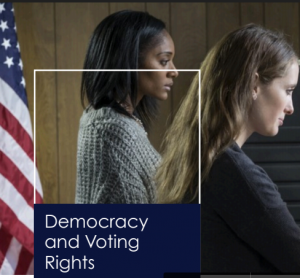 Democracy and Voting Rights (Page 1)
Democracy and Voting Rights (Page 1)
This election is more than a choice between parties and ideologies. An even more fundamental question is at stake: Can we preserve democracy in the face of serious threats to fair elections and fundamental rights?
Questions for Reflection and Candidates
- How do you see democratic values at risk today?
- How do systemic barriers to voting undermine our most sacred democratic values?
- How can your faith community better advocate for stronger voter protections at the state and local level?
- As a candidate, what are your specific plans for protecting and strengthening voting rights?
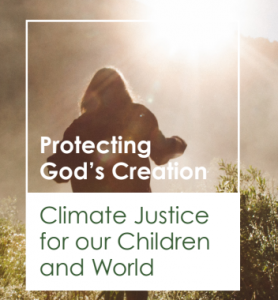 Protecting God’s Creation Climate Justice for our Children and World (Page 2)
Protecting God’s Creation Climate Justice for our Children and World (Page 2)
As people of faith, we believe that responding to the urgent threat of climate change is essential to caring for God’s creation and loving our neighbors. Human activity, primarily the burning of fossil fuels for energy, has thrown
nature out of balance, polluted the air, driven thousands of species of God’s creatures to extinction, intensified catastrophic events such as wildfires and hurricanes, and threatened the lives and livelihoods of our most vulnerable brothers, sisters and neighbors around the world. Scientists tell us we have less than a decade to avoid even more catastrophic consequences.
The United States has a unique responsibility to show moral and political leadership:
- Transitioning our economy away from polluting fossil fuels toward 100% clean energy.
- Honoring the emissions-reduction commitments our nation made at the UN Conference on Climate Change in Paris in 2015, and taking additional actions needed to avert catastrophic global warming.
- Assisting developing nations— who are least responsible for climate change but most impacted by it — in coping with threats such as increased droughts, disease, and sea-level rise by sharing technology and financial support.
Questions for Reflection and Candidates
- What does your faith teach about our responsibilities for the Earth and to others? How are they interdependent?
- Has your faith community made an effort to cut emissions, save energy, or practice environmental stewardship?
- As a candidate, what specific policies do you support to protect God’s Creation and secure a safe climate for our children and future generations?
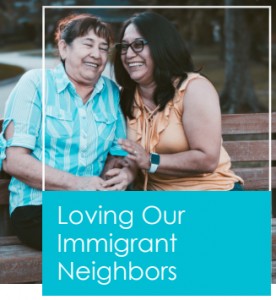 Loving Our Immigrant Neighbors (Page 4)
Loving Our Immigrant Neighbors (Page 4)
Scripture repeatedly makes clear that immigrants must be treated with dignity. Policies that rip children from their parents’ arms, lock people away in inhumane conditions, and ban desperate families from entering the country
should keep us awake at night. As people of faith, we believe that the way we treat our immigrant neighbors is a sign of how we treat God.
Questions for Reflection and Candidates
- How can we replace immoral immigration policies that tear families apart and cause trauma with an immigration system that values families and affirms the dignity of allv people?
- What can we do to heal the wounds inflicted on immigrant communities by political rhetoric that portrays them as a dangerous “other?”
- If there are immigrants in our community who are feeling isolated and under threat, how can we show support and build connections?
- As a candidate, what will you do to defend the dignity of all immigrants, and how will you further policies that keep families together?
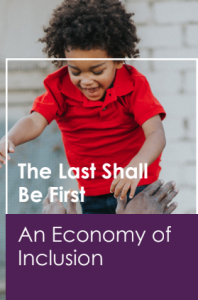 The Last Shall Be First An Economy of Inclusion (Page 5)
The Last Shall Be First An Economy of Inclusion (Page 5)
Our economic systems should work for all Americans, not only the wealthiest few. This is a matter of justice and
human dignity. All religious traditions recognize that charity is essential to care for the most vulnerable, but helping our neighbors in poverty also compels us to address its root causes. “Charity is no substitute for justice withheld,” St. Augustine observed centuries ago.
Questions for Reflection and Candidates
- What can we do to ensure that all Americans are able to provide for their families and live with security and dignity?
- How do we create a just tax system that is fair to all Americans, including working families who are trapped in poverty?
- Why does the United States lag behind most developed countries when it comes to providing paid sick leave and paid family leave?
- As a candidate, what are your specific plans to ensure workers have living wages and economic security while the coronavirus pandemic continues, as well as for the long term?
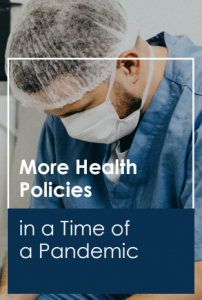 More Health Policies in a Time of a Pandemic (Page 7)
More Health Policies in a Time of a Pandemic (Page 7)
Despite our nation’s stated values of life and equality, the United States is the only industrialized country in the world that does not guarantee its residents universal access to health care. This is a failure of political and moral imagination – especially in a time of pandemic.
Questions for Reflection and Candidates
- How can people of faith be most effective in using our stories, congregations and power to advocate for health care reform?
- What do you struggle with the most when it comes to our healthcare system?
- How has the COVID-19 crisis impacted your community? What policy solutions can keep us all safe and remedy racial and economic inequalities in your community?
- As a candidate, what are your specific plans for making sure that quality,
affordable health care is available for all?
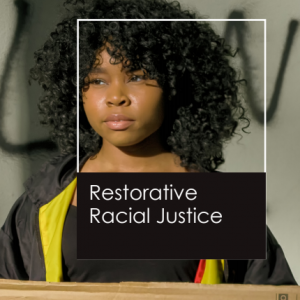 Restorative Racial Justice (Page 9)
Restorative Racial Justice (Page 9)
Justice and redemption are at the very heart of faith. Restorative justice begins with listening to and empowering communities that have been exploited, excluded and denied equal representation and freedom. The evil ideology of
white supremacy shaped our nation from its founding and continues to impact policies and communities today, especially in the criminal justice system. The killings of Ahmaud Arbery, Breonna Taylor, George Floyd and so many other Black people, Indigenous people, and other people of color, has provoked a growing, multi-racial moral movement for accountability and systemic reforms for racial justice.
Questions for Reflection and Candidates
- How can we dismantle the evil ideology of white supremacy in our culture and political systems?
- What can be done to end racial profiling and police violence against people of color?
- What steps can be taken to ensure formerly incarcerated people have voting rights and fair access to employment?
- As a candidate, what will you do to ensure racial justice is prioritized in the criminal justice system?
- How do we build safe communities for everyone, particularly people of color?
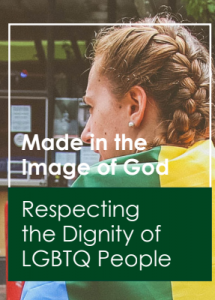 Made in the Image of God: Respecting the Dignity of LGBTQ People (Page 11)
Made in the Image of God: Respecting the Dignity of LGBTQ People (Page 11)
All people have inherent dignity because everyone is created in the image of God. Our gay, lesbian, bisexual and transgender family members, neighbors and co-workers deserve equal rights, and to live without fear or discrimination.
Questions for Reflection and Candidates
- How can your faith community more fully support the equal dignity of LGBTQ people in your state and local area?
- What are the greatest threats to LGBTQ people in your community and the nation?
- As a candidate, what are your specific plans to ensure that LGBTQ people have equal rights and are treated with dignity
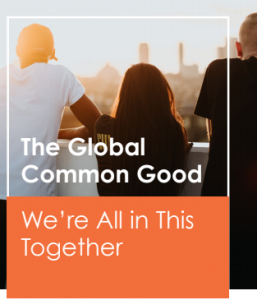 The Global Common Good: We’re All in This Together (Page 12)
The Global Common Good: We’re All in This Together (Page 12)
What does it mean to love our neighbors as ourselves in a globalized world? The health and future of our country and
communities are interconnected to the health and security of other nations. Our fates are bound up in what Rev. Martin Luther King, Jr., called “an inescapable network of mutuality.”
Questions for Reflection and Candidates
- What policies do you think are most important for creating security for your family and community?
- What role should the United States play in the world to help build global peace and security?
- How can your faith community advocate for policies to create a more peaceful world?
- As a candidate, what programs and policies would you prioritize to help build secure communities and a peaceful world?

COP 26: The Earth is the Lord’s
/in Earth & Faith, Faithful Citizenship, Featured Articles, NEWS, UN Climate Meetings /by adminRev. Vy Nguyen, Executive Director for Week of Compassion (the relief, development, and refugee ministry for the Christian Church, Disciples of Christ) offers today’s reflection from the COP-26 summit in Scotland. He is a member of IPL Board of Directors.
Here is an excerpt
Three Organizations Speak Out on Bipartisan Infrastructure Package
/in Faithful Citizenship, Featured Articles /by adminIndigenous Environmental Network
Climate Justice Alliance
Grassroots Global Justice
Let us be frank. As communities on the frontlines of the climate crisis and fossil fuel extraction, our situation is dire. While we experience unparalleled disaster in the form of floods, fires, droughts, Missing & Murdered Indigenous Peoples and state-sanctioned violence against Indigenous and Black communities, the crisis at the so-called border, and other results of climate chaos, we know U.S. elected leadership is in the position to redirect course on behalf of Mother Earth and future generations. The truth is, Congress promised our communities they would work to solve the climate crisis and environmental justice once we elected them into office, but instead, we see them fighting to fund fossil fuels and false promises masquerading as climate solutions to the tune of billions of dollars. Rather than solving climate change Congress is exacerbating it.
Over the course of positive engagement over the last several months, we asked Congress – and received many assurances – that the provisions, technologies, and projects in the Bipartisan Infrastructure package and the Build Back Better Act (the reconciliation package) will support Indigenous, Black, Brown, Asian and Pacific Islanders, communities of color, low income, migrant, and frontline communities to address environmental justice. While we are happy to claim our wins (which we see as a testament to the power of frontline intervention in federal policy), it is important to also name what is missing and what is harmful in these packages. Specifically, we demanded Congress oppose false “clean energy” solutions in the Clean Electricity Performance Program (CEPP), include set-asides for frontline communities, and include both Justice40 and climate standards in the Build Back Better Act. Unfortunately, these important requests and demands were undermined through a political process intentionally designed to silence the voices of impacted communities while maintaining the status quo.
Congress claims these packages will be historical provisions for climate action and environmental justice – but we know better. While we have fought hard for measures including increased care, social safeguards, affordable housing, building upgrades, public transit, and paid sick leave, there are many components of these two packages that will deepen injustices, entrench climate impacts, displace families, upend local economies, and deadlock us into a decade of false solutions. We cannot be complicit by letting it proceed without challenge. It is imperative we make clear our position while explaining the environmental and community harm as well as the human rights impacts these legislative measures will perpetrate.
How the Bipartisan Infrastructure Package and Build Back Better Act Conflict with Environmental Justice Principles
Justice
The Justice40 pledge will not be met in the infrastructure packages. Frontline communities were promised 40% of funding to be earmarked for projects to build safer and stronger communities in order to confront the climate emergency. We already see a structure being set up that would allow for the funding to be used as “benefits” and not direct funding. These so-called benefits could take the form of harmful programs and some that should have happened anyway. Further, there is a mapping tool being built that replicates old colonial mapping systems to differentiate whether a community will fall under their criteria or not.
While there are set-asides for Tribes, they are inadequate and absent in a robust recognition of Indigenous sovereignty and assurances for Free, Prior, and Informed Consent (FPIC). The federal government is obligated through laws, trust responsibilities, treaties and other policies to ensure that funding under Justice40 and other federal programs to Indigenous nations is more than adequate to address significant disparities resulting from colonization.
The National Environmental Policy Act (NEPA) is designed to ensure that agencies and departments consider the significant environmental consequences of their proposed actions and inform the public about decision-making. However, the Bipartisan Infrastructure Bill includes language to suppress public input, shorten permitting processes to determine how a project will impact a community, shrink consideration of alternative approaches, and create large exclusions for multiple categories of projects.
Energy & Water
Fossil fuel subsidies are included in both packages. The Bipartisan Infrastructure Bill has $25 billion slated for new fossil fuel subsidies. In addition, the Build Back Better Act also includes at least $15 billion. This does not even include the subsidies for fake “clean” energy in the CEPP. Ramping up fossil fuel development locks us into decades of extractivism, violence and injustice.
Alaska Liquefied Natural Gas export terminal is funded through the Bipartisan Infrastructure Package and oil and gas development in The Arctic National Wildlife Refuge is expanded.
The Clean Electricity Performance Program (CEPP) in the Build Back Better Act provides incentive payments and does not penalize utility corporations for the generation of electricity from fossil fuels and false solutions. This includes: fossil gas with and without carbon capture and storage and other fossil-based technologies; waste incineration and other combustion-based technologies; bioenergy including biomass, biofuels, factory farm gas, landfill gas, and wood pellets; hydrogen; nuclear; and new, large-scale and ecosystem-altering hydropower, and all market-based accounting systems like offsets. Earlier this year, over 700 groups endorsed a letter to fight for distributed renewable energy for frontline communities. We were largely ignored. Instead, the CEPP is being touted as the flagship program for climate action. We cannot keep providing billions to these industries and pretend it is a win for climate justice. This false “clean” energy will increase the pollution burden on Indigenous, Black, POC and frontline communities. Instead of funding these false solutions, the funding should be allocated to distributed renewable energy for wind and solar with 40 percent clearly set aside for frontline communities.
Lead service line replacement is earmarked at $15 billion in the Bipartisan Infrastructure Bill, which would only address approximately 25 percent of lead service lines and resign multiple generations to compromised health. The House has included an additional $30 billion for lead pipes replacement in their version of the budget, however no clear commitment has come out of the Senate, making the total amount of funds for lead pipes replacement uncertain. Billions more are needed to ensure that Indigenous, low-income communities and communities of color have access to safe drinking water and sewage line installation.
False solutions
False solutions are funded in both packages. Some as direct funding in the Bipartisan Infrastructure Bill and Build Back Better Act and other funding through the CEPP in the Build Back Better Act. This is a short list of just some of the false solutions we oppose in the packages:
Congress is demonstrating what happens when frontline and impacted communities are not centered in federal policy. Life-saving priorities are watered down or completely abandoned through the process, while greedy and harmful corporations come out on top. The truth is, we learned that many in Congress are not fully invested in frontline communities or solving the climate emergency, even though they say they are. This is why it is vital we continue engaging and pushing Congress to remain accountable to the promises they made. We know the true power lies with the people. Now is the moment to stand on the right side of history, on behalf of Mother Earth and future generations. Rather than pretend this legislation does not perpetuate injustices to Indigenous, Black, and frontline communities and exacerbate the climate crisis, we will continue to stand with frontline struggles and uplift principles of environmental and economic justice. And we will continue to demand Congress do the same.
Testimony on State Methane Rules: Anita Amstutz
/in Faithful Citizenship, Featured Articles, NEWS, Permian Basin /by adminMembers and supporters of New Mexico Interfaith Power & Light have prepared testimony for hearings held by the Environmental Improvement Board. The hearings, held the week of Sept. 20-24, are in support of the The New Mexico Environment Department’s (NMED) strong proposal to cut ozone-forming volatile organic compounds (VOCs) and methane released by the oil and gas industry. This testimony comes from Anita Amstutuz, a memberof the NM-IPL Advisory Board.
New Mexico has a methane problem. Oil and gas operations release more than 1.1 million tons of methane each year (That has the same short-term climate impacts as 22 coal-fired power plants or 28 million automobiles.)
Methane is a powerful climate change pollutant responsible for 25% of the warming we’re experiencing today. Operations release more than 337,500 tons of smog-forming volatile organic compounds as well as toxic air pollutants that affect health, especially most vulnerable children and elderly. In the Land of Enchantment, this is not acceptable. Have we become a sacrifice zone?
Methane pollution is a top tier environmental issue in New Mexico. In 2021, the Colorado College’s bipartisan Conservation in the West survey found that 89% of voters support requirements for companies to update equipment and technologies to address methane and air pollution.
The time is now. As global temperatures soar and violent, catastrophic fires, storms and other natural disasters increase, we must do our part to curb what is destroying our land, soil, air.
Please address the following:
As a long time beekeeper, I am also aware of the devastating climate changes on the insect world and all wildlife. Please do the right thing now. Future generations are depending on your prudence and wisdom.
Sincerely,
—
Anita Amstutz
Albuquerque, NM